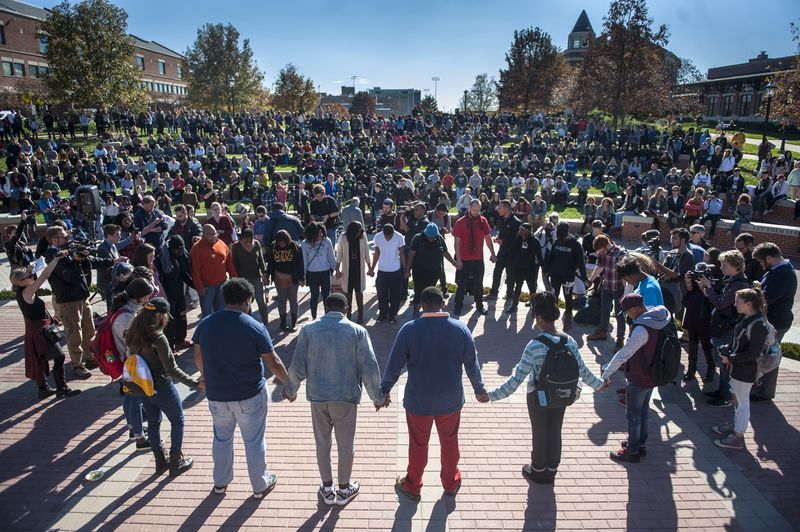My boss was at a seminar recently where he met a University of Maryland journalism major who talked about her experiences as an African-American student on campus. One incident stood out, and my editor shared it with me. It involved a crude remark by a white roommate.
Credit: Maureen Downey
Credit: Maureen Downey
With the focus now on racism on campus, both subtle and overt, I asked newly minted University of Maryland graduate Taylor Johnson to expand on what happened in an essay for the blog.
In the piece, Johnson uses a term that is being discussed a lot lately on America's campuses: microaggressions. Microaggressions are comments, both intentional or unintentional, that casually degrade people.
In his book,"Microaggressions In Everyday Life: Race, Gender, and Sexual Orientation," Columbia professor Derald Wing Sue says racism and sexism now often take a more covert form -- brief, everyday exchanges undergirded with denigrating messages.
Here is a good short video interview with Sue on how these small slights and indignities marginalize their targets. His research has shown microaggressions are more harmful and impactful than overt instances of racism.
What struck me about Johnson's experience with her University of Maryland roommate was how unexpected and inexplicable the microaggression was, given the young women had congenial living arrangements.
By Taylor Johnson
“I didn’t mean to say it. It slipped.”
When someone uses that statement to explain a racial joke or insensitive remark, you can most likely assume it wasn’t a “slip.”
The words that come out of our mouths are thoughts in our minds that we consciously develop before we release them, whether jokingly or not. Being a member of a community made up of diverse races, ethnicities and cultures calls for more sensitivity from individuals even if you feel you are making a statement in secret. You never know who’s listening or how they will respond.
About to receive my diploma from the University of Maryland, I have been reflecting on memorable moments of my college career, both good and bad. In the midst of high racial tensions in various communities and on college campuses, I thought back to when another black student, one of my four roommates at the time, and I experienced a microaggression from one of our two white roommates.
I never had a problem with any of my roommates. They seemed to be very nice girls and easy to live with. Until one Saturday night when my black roommate experienced an insensitive microaggression. It was fairly dark in the dorm room, so when our two roommates entered they could not tell she was there. One of them announced the room smelled of “black butthole.” They both laughed, not knowing my roommate heard it all. Shocked and offended, she texted me about the incident.
I was taken aback. I am not an aggressive person, but I did want to talk to the roommate who made the comment and I wanted her to be truthful, apologize and learn from her actions. When I returned to the dorm and she saw me, she started crying and going on and on about how she’s not racist and that what she said accidentally “slipped.”
I wonder if she grew so emotional out of guilt or because she didn't want her character to be tarnished. She was a bright student and campus leader. I’m sure the last thing she wanted was to be seen in a negative light. Sadly, she couldn’t offer a real explanation for the vulgar remark. She kept repeating she was sorry and not racist.
I wasn’t sympathetic because I couldn't accept something so crude could accidentally be uttered. I let her have her crying jag and forgave her in the end, but, of course, I have not forgotten. Beyond the incident, I didn't feel uncomfortable living with her because she didn't pose a threat to me. However, the next few days were awkward. There was still tension, but it diminished. However, she had lost my trust.
After we were no longer roommates, she would be extremely nice when we saw each other on campus and go the extra mile to make sure she spoke to me. It always felt awkward because the effort seemed ungenuine.
What gets me the most about the justification that something insensitive “slipped” is that if it were an accident there would be no reason to be so apologetic. Another thought: what made her feel that it was okay to say something so offensive aloud to her friend when she would never dare say such a thing if we were around?
Making jokes based on color and race is never acceptable. Such accidental “slips” can be taken to heart and could potentially yield a not-so-happy ending. It all comes down to the age-old saying, “Think before you speak.”
What may seem like a tiny microaggression speaks to a larger issue. Insensitive remarks in regards to race, whether blatant or subtle, remain common and must be brought under control.
About the Author







